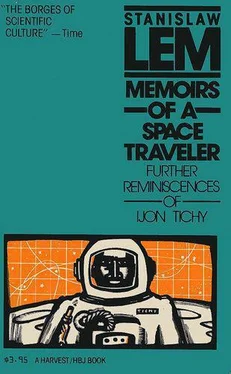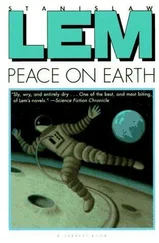“Mr. Tichy, let’s make a deal. Refrain from scoffing for fifteen minutes. Then you can scoff to your heart’s content. Agreed?”
“Agreed,” I said, reverting to my former dry tone. “Continue.”
He was not a braggart, I decided now. His tone was too categorical. Braggarts are not dogmatic. He was probably mad.
“Have a seat,” I mumbled.
“The thing is elementary,” said the man who called himself Professor Decantor. “People have believed in the soul for thousands of years. Philosophers, poets, founders of religions, priests, and churches have repeated all possible arguments in favor of its existence. According to some beliefs, the soul is an immaterial substance separate from the body which preserves a person’s identity after his death; according to others it is supposed to be — this is a view prevalent among Eastern thinkers — an entelechy devoid of individual personality. But the belief that man does not pass into nothingness at the time of death, that something in him survives death, has remained unshakable in minds for ages. We now know that there is no soul. There are only networks of nerve tissue in which certain life-related processes occur. What the possessor of such a network feels, what his consciousness perceives — that is the soul. Such was the situation until I appeared. Or, rather, until I told myself: There is no soul. The fact has been proved. But there is a need for an immortal soul, a desire for permanence, for infinite personal continuation in time, despite the passing and ultimate decay of all things. This intense longing, which mankind has felt since the dawn of its existence, is all too real. Why, I thought, shouldn’t I be able to fulfill this age-old dream? I first considered making people physically immortal — but rejected that solution as being, basically, the prolongation of false and deceptive hopes, because immortal people can die, all the same, from accidents and disasters. Besides, it would have entailed a host of difficulties, such as overpopulation. This and other considerations led me to invent the soul. Only the soul. Why — I asked myself — could it not be built as an airplane is built? After all, at one time flight was only a fantasy, and now look. By approaching the problem thus, I solved it. The rest was merely a matter of gathering information, acquiring the means, and exercising patience. Which I did — and therefore can tell you today that the soul exists, Mr. Tichy. Anyone can have one, an immortal one. Individually tailored, fully guaranteed. Is it eternal? The word really means nothing. But my soul — the soul I can produce — will survive the death of the Sun and the freezing of the Earth. I can bestow a soul, as I said, on any person, provided that the person is living. I cannot bestow souls on the dead; that does not lie within my power. But the living are another matter. They will receive an immortal soul from Professor Decantor. Not for free, of course. Being the product of modern technology, of a complex and time-consuming process, it will cost a great deal. With mass production the price should drop, but for the time being the soul is far more expensive than an airplane. However, considering that it is eternal, I think the price is relatively low. I have come to you because the construction of the first soul has completely exhausted my funds. I propose to you that we form a joint company with the name ‘Immortality.’ In return for financing the enterprise, you will receive a majority of the shares and forty-five percent of the new profit. The shares would be nominal, but on the board of directors I would reserve the…”
“Excuse me,” I interrupted. “You have, I can see, an extremely detailed plan for this enterprise. But shouldn’t you, first, tell me more about your invention?”
“Of course,” he replied. “But until we sign a notarized contract, Mr. Tichy, I can only give you information of a general nature. I laid out so much money in the course of my experiments, there was not even enough left to pay for patenting.”
“I understand your caution. But surely you realize that neither I nor any financier — not that I am a financier — in short, no one will take your word for it.”
“Of course.” He reached into his pocket and lookout a package. Wrapped in white paper, it was as flat as a small cigar box.
“This contains the soul… of a certain person,” he said.
“May I know whose?” I asked.
“Yes,” he replied after a moment’s hesitation. “My wife’s.”
I looked at the tied and sealed box with great disbelief, and yet, because of his forceful, categorical manner, I felt something like a shudder.
“Aren’t you going to open it?” I saw that he held the box in his hands without touching the seal.
“No. Not yet. My idea, Mr. Tichy, simplified almost to the point of distortion, is as follows. What is our consciousness? As you look at me at this very moment from your comfortable chair and smell the odor of your good cigar, which you did not see fit to offer me; as your eyes perceive my figure in the light of this exotic lamp; as you wonder whether to consider me a swindler, a lunatic, or a remarkable person; and, finally, as your eyes observe all the lights and shadows of your surroundings, and your nerves and muscles keep sending telegrams about their condition to your brain — all this represents your soul, to use the language of the theologians. You and I would say, rather, the active state of your mind. Yes, I admit I use the term ‘soul’ out of a certain perversity. The term, however, is simple and enjoys universal recognition: everyone thinks he knows what is meant when he hears it.
“Our materialist viewpoint, of course, reduces to fiction not only the immortal, incorporeal soul, but also the soul as an invariable, timeless, and eternal thing. Such a soul, you will agree, has never existed; none of us possesses it. The soul of a young man and that of an old man, though there may be points in common when we speak of the same person — his soul when he is a child and at the moment when he lies at death’s door — these are extremely different states of consciousness. In speaking of a person’s soul, we automatically think of his mental state when he is in his prime and in the best of health. It was this state, therefore, that I chose for my purpose. My synthetic soul is the permanently recorded cross section of the awareness of a normal, vigorous individual. How do I do this? I take a substance well suited for the purpose and reproduce in it the configuration of the living brain with the utmost fidelity, atom for atom, vibration for vibration. The copy is reduced on a scale of fifteen to one. That is why the box you see is so small. With a little effort the soul could be further reduced in size, but I see no reason to do so; besides, the cost of production would become exorbitant. Now, then, the soul remains recorded in this material; it is not a model, not an immobile, inert network of nerves, as I first thought, when I was still conducting experiments on animals. Here I came up against the greatest, the only, obstacle. You see, I wished to preserve a living, alert consciousness in this material, a consciousness capable of the freest thought, of dreaming and waking, of flights of imagination, a consciousness ever changing, ever sensible of the passage of time — but I wished also to keep it ageless, to prevent the material from tiring, cracking, or crumbling. There was a time, Mr. Tichy, when this task seemed impossible to me, as it must seem impossible now to you. The one ace up my sleeve was persistence. Because I am persistent, Mr. Tichy. That is why I succeeded…”
“One moment,” I said, slightly confused. “What are you saying? Here, in this box, there is a material object, yes? Which contains the consciousness of a living person? But how does it communicate with the outside world? And see? And hear?…” I broke off, for an indescribable smile appeared on Decanter’s face. He looked at me out of his screwed-up green eye.
Читать дальше












